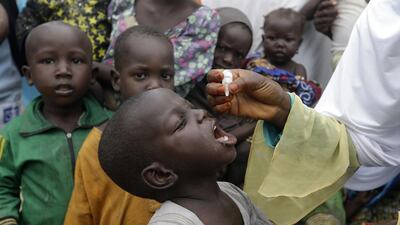The coronavirus pandemic is disrupting crucial progress to provide vaccines for other diseases, putting around 80 million children at risk, Gavi, the World Health Organisation and Unicef warned on Friday.
In a statement, the organisations said the Covid-19 pandemic would disrupt work on life-saving immunisation programmes around the world – in both rich and poor countries – for diseases including diphtheria, measles and polio.
Data collected by the three organisations and the Sabin Vaccine Institute showed progress into curing diseases has been “substantially hindered” in at least 68 countries and is likely to affect approximately 80 million children under the age of one living in those countries.
More than half (53 per cent) of the 129 countries where data was available reported either moderate-to-severe disruptions, or a total suspension of vaccination services during March and April this year.
The organisations warned that, since March, routine immunisation services for vulnerable children have been disrupted on a global scale that may be unprecedented since the start of expanded programmes on immunisation (EPI) in the 1970s.
The reasons for the disruptions vary. For example, some parents are reluctant to leave home because of restrictions on movement, lack of information or because they fear they will catch Covid-19. There is also a dearth of health workers due to travel restrictions or redeployment to coronavirus response duties, as well as a lack of protective equipment.
Transport delays of vaccines amid the coronavirus pandemic are also hobbling progress. Unicef has reported a substantial delay in planned vaccine deliveries due to the lockdown measures and the ensuing decline in commercial flights and limited availability of charters. The charity is appealing to governments, the private sector, the airline industry, and others to free up freight space at an affordable cost for life-saving vaccines.
Many countries have temporarily and justifiably suspended preventive mass vaccination campaigns against diseases like cholera, measles, meningitis, polio, tetanus, typhoid and yellow fever due to risk of transmission and the need to maintain physical distancing during the early stages of the Covid-19 pandemic.
Measles and polio vaccination campaigns, in particular, have been badly affected, with measles campaigns suspended in 27 countries and polio campaigns put on hold in 38 countries. At least 24 million people in 21 Gavi-supported lower-income countries are at risk of missing out on vaccines against polio, measles, typhoid, yellow fever, cholera, rotavirus, HPV, meningitis A and rubella due to postponed campaigns and introductions of new vaccines.
The stark warning from the three organisations comes ahead of the Global Vaccine Summit on 4 June, where world leaders will come together to help maintain immunisation programmes and mitigate the impact of the pandemic in lower-income countries.
“Immunisation is one of the most powerful and fundamental disease prevention tools in the history of public health,” said Dr Tedros Adhanom Ghebreyesus, WHO director-general. “Disruption to immunisation programmes from the Covid-19 pandemic threatens to unwind decades of progress against vaccine-preventable diseases like measles.”
“At the June 4 Global Vaccine Summit in London, donors will pledge their support to Gavi, the Vaccine Alliance, to sustain and accelerate this lifesaving work in some of the most vulnerable countries. From the bottom of my heart, I urge donors to fully fund the Alliance. These countries, these children especially, need vaccines, and they need Gavi.”
“More children in more countries are now protected against more vaccine-preventable diseases than at any point in history,” said Dr Seth Berkley, Gavi CEO.
“Due to Covid-19 this immense progress is now under threat, risking the resurgence of diseases like measles and polio. Not only will maintaining immunisation programmes prevent more outbreaks, it will also ensure we have the infrastructure we need to roll out an eventual Covid-19 vaccine on a global scale,” she added.
“We cannot let our fight against one disease come at the expense of long-term progress in our fight against other diseases,” said Henrietta Fore, Unicef executive director.
“We have effective vaccines against measles, polio and cholera. While circumstances may require us to temporarily pause some immunisation efforts, these immunisations must restart as soon as possible, or we risk exchanging one deadly outbreak for another.”
Next week, the WHO will issue new advice to countries on maintaining essential services during the pandemic, including recommendations on how to provide immunisations safely.






























